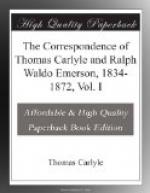has been the occasion of an outcry in all our leading
local newspapers against my “infidelity,”
“pantheism,” and “atheism.”
The writers warn all and sundry against me, and against
whatever is supposed to be related to my connection
of opinion, &c.; against Transcendentalism, Goethe,
and
Carlyle. I am heartily sorry to see this
last aspect of the storm in our washbowl. For,
as Carlyle is nowise guilty, and has unpopularities
of his own, I do not wish to embroil him in my parish
differences. You were getting to be a great
favorite with us all here, and are daily a greater
with the American public, but just now,
in Boston,
where I am known as your editor, I fear you lose by
the association. Now it is indispensable to
your right influence here, that you should never come
before our people as one of a clique, but as a detached,
that is, universally associated man; so I am happy,
as I could not have thought, that you have not yielded
yourself to my entreaties. Let us wait a little
until this foolish clamor be overblown. My position
is fortunately such as to put me quite out of the reach
of any real inconvenience from the panic-strikers
or the panic-struck; and, indeed, so far as this uneasiness
is a necessary result of mere inaction of mind, it
seems very clear to me that, if I live, my neighbors
must look for a great many more shocks, and perhaps
harder to bear.
The article on German Religious Writers in the last
Foreign Quarterly Review suits our meridian
as well as yours; as is plainly signified by the
circumstance that our newspapers copy into their columns
the opening tirade and no more. Who wrote
that paper? And who wrote the paper on Montaigne
in the Westminster? I read with great satisfaction
the Poems and Thoughts of Archaeus in Blackwood.
“The Sexton’s Daughter” is a beautiful
poem: and I recognize in them all the
Soul, with joy and love. Tell me of the author’s
health and welfare; or, will not he love me so much
as to write me a letter with his own hand? And
tell me of yourself, what task of love and wisdom the
Muses impose; and what happiness the good God sends
to you and yours. I hope your wife has not forgotten
me.
Yours affectionately,
R.W.
Emerson
The Miscellanies, Vols. I. and II., are
a popular book. About five hundred copies have
been sold. The second article on Jean Paul works
with might on the inner man of young men. I hate
to write you letters on business and facts like this.
There are so few Friends that I think some time I
shall meet you nearer, for I love you more than is
fit to say. W.H. Channing has written a
critique on you, which I suppose he has sent you, in
the Boston Review.
XXIX. Carlyle to Emerson
5 Cheyne Row, Chelsea, London 7 November, 1838




